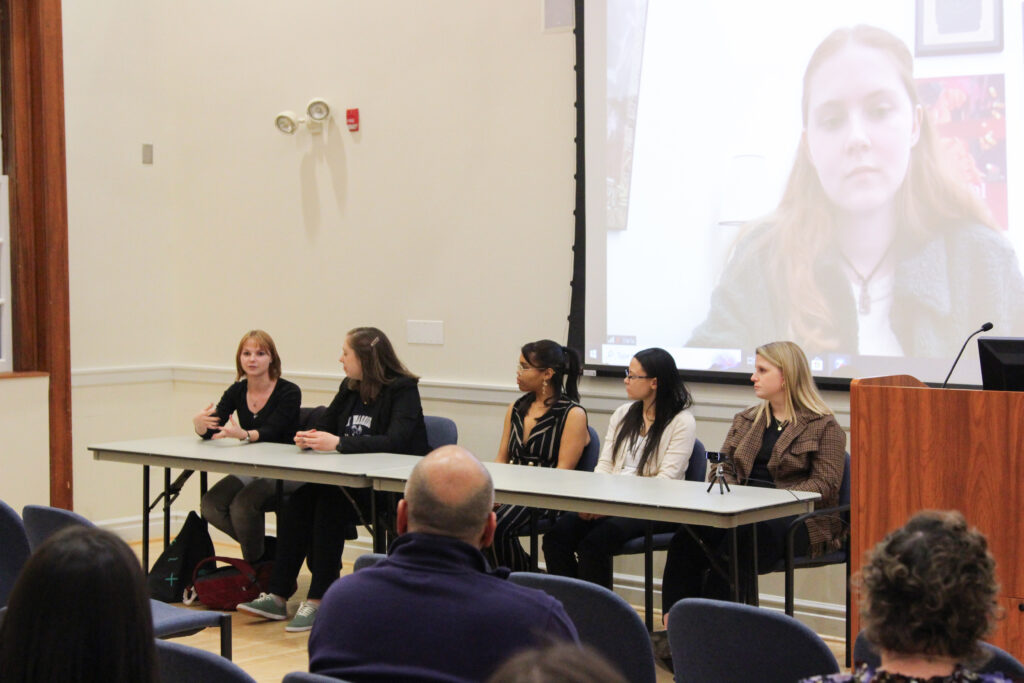Communication and digital studies alumni advise students on post-graduation success, how to market academic skills
4 min read
The alumni panelists shared their personal experiences entering the workforce after graduating from UMW. | Charlie Li, The Weekly Ringer
by GEOFFREY CARLISLE JR
Staff Writer
On April 4, current students, faculty and communication and digital studies alumni congregated in Lee Hall to discuss post-graduation plans, recommendations for the job search and tips for success. Between their personal stories and advice, the alumni panelists reminded students that they should rely on the work they did at UMW to market themselves in the professional workplace.
Mandy Byrd ‘22 worked at the Digital Knowledge Center when she attended UMW, and she said that the president of BRG Communications—where she currently works as an associate—told her that her background there made her stand out.
Stella Swope ‘21, an associate editor at Wild Card Creative Group, honed her hobby of video editing into a professional skill through working at the DKC, and she also emphasized this experience to market herself to employers.
“I worked at the DKC and that was a great thing that I used to leverage coming in,” said Swope. “They wanted me to help teach everyone else in the company how to do timesheets and I was like, ‘Oh, that’s great, I made tutorial videos on how to use so many digital tools [at the DKC].’”
Combining the skills from the communication and digital studies major and her work at the DKC, Swope’s final paper cross-comparing Lil Nas X’s music videos exemplified her digital media literacy.
As an associate editor, Swope works to figure out how to attract an audience to a movie, and she said her coursework helped her make that connection by understanding how people look at media and how they interact with it.
“I think a lot of the pieces that we read were very informative [and] helped me fix how I was viewing these things,” said Swope.
Kate Seltzer ’21, a freelance journalist, and Jess Kirby ‘23, a reporter for the Loudoun Times-Mirror, spoke on the skills they learned from working on the editorial board for The Weekly Ringer. Seltzer served as news editor and editor-in-chief when the newspaper was called “The Blue and Gray Press,” and Kirby served two consecutive years as editor-in-chief after holding a news editor position her sophomore year.
“[Kirby] and I were both super involved in student journalism here and now we get to do that full-time,” said Seltzer. “So if there’s something that you really want to do while you’re here, it can kind of shape your career.”
With many seniors in the audience, the panelists were able to cover a range of experiences that showed the possibilities of work after graduation. Seltzer and Byrd immediately found a position in the professional world, while Kirby and Swope found jobs elsewhere while continuing their job search.
According to the panelists, an essential aspect of applying for a job is having an up-to-date resume and LinkedIn profile. They also recommended that students organize their academic work in folders, on a USB drive or in Google Drive. This helps students have easy access to their past projects to create a portfolio in case a potential employer wants examples of work they have completed.
For Emily Kaser ’19, a marketing senior account executive at Merritt Group, it’s helpful to update a portfolio gradually.
“I have everything saved from when I was in undergrad to grad. I had every single piece and I still do it now for whenever I am ready to leave,” she said. “I have all of the current work that I’ve done because I feel like you do a lot in a month and you’re like, ‘Oh, I forgot about that.’”
According to the panelists, another step students should take when applying for jobs is to research their industry of interest for a successful cover letter and interview. However, if jobs do not appear in their search, the panelists recommended that students reach out to individuals already in the industry to gain insight into common workplace norms and terminology.
Sometimes, positions have ambiguous or obscure titles that students do not recognize and therefore do not apply for. According to Kaser, learning about these field-specific position titles and looking at the requirements within each gives a better view of what the position entails.
“I was so confused and then I started researching all these marketing agencies and they all had the same title,” said Kaser. “So do a little bit of research because sometimes the job title is a little misleading.”
Although the panelists relayed many stories of success, they reminded students that those experiences also came with many mistakes. Some also expressed their retrospective worries about their choice to enter the workforce right away.
Michaela Daye ’18, a program support specialist for the U.S. Army said, “I definitely wish that I would have slowed down a little bit, maybe study abroad or take a little break because I jumped right into work.
She continued, “I looked back and I was just so excited and now I’m just like ‘why?’ Like, I just want a break.”
Swope also wished she had taken some time before entering the cinematography field right out of college. She reminisced about a friend who works for AmeriCorps and travels the country, working with her hands and experiencing things she may not have otherwise.
“I think it’s really valuable to be able to say, ‘Hey, I worked in Georgia with disaster relief,’ like that’s a cool thing,” she said. “You can take that anywhere with you, it’s an invaluable life experience.”


